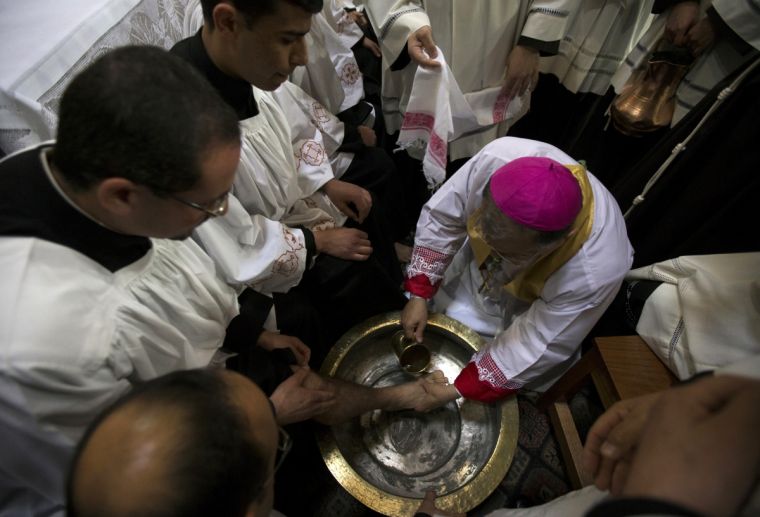Should Christians wash each other's feet on Maundy Thursday?
Today is the day Christians mark the Last Supper of Jesus and his disciples. It's from this meal that Judas goes out into the night to betray him. And it's here that Jesus gives his disciples a powerful visual image of how they are to behave, by washing their feet – a task usually given to a servant. Peter is reluctant: 'No,' said Peter, 'you shall never wash my feet.' But Jesus answered, 'Unless I wash you, you have no part with me' (John 13:8).
And John tells us he said: 'Now that I, your Lord and Teacher, have washed your feet, you also should wash one another's feet. I have set you an example that you should do as I have done for you' (John 13: 14-15).

These words of Jesus have been taken at face value as a commandment by many Christians, even in countries where the culture is very different – and where, for instance, modern footwear and tarmac roads mean feet don't get dusty and soiled as they would have done in Jesus' day. Tonight, in many Maundy Thursday services, Christians will re-enact the last supper by literally washing each other's feet.
Many who do so will find that a powerful example of service. For many, too, there's an embarrassment factor to get over, especially in countries like the UK where we're not really used to touching each other. Acknowledging this is part of the meaning of the ritual: it's hard, and this awkwardness reflects the awkwardness of having someone do something for us rather than doing it ourselves. We are not quite in control; we're out of our spiritual comfort zone, and that's good.
But there's another way of looking at it.
Perhaps washing each other's feet is a kind of displacement activity. Foot-washing was a powerful symbol of service in 1st-century Palestine, but for us it's just rather odd. So perhaps we should be looking for its 21st-century Western equivalent.
But what might that be? It's quite difficult to translate, particularly in our own times, when society isn't nearly as structured and stratified as it was then – and as it was for us too, even a few decades ago.
At its heart is the reversal of roles, the upending of expectations, so that the one who ought to be served becomes the server. The person who's used to being in authority submits to being ministered to. The person with all the answers, the problem-solver, becomes the passive recipient of someone else's ministry.
It's hard, in fact, to think of a contemporary action that's as loaded with symbolism as Jesus washing the disciples' feet – and perhaps that's just a reflection of how revolutionary his action was. But it's not so difficult to think of how the meaning of his act translates to our time. In a church context, it might be the minister or wise church elder who listens with an open heart to the opinions of a young person, without feeling the need to contribute or correct. It might be someone who knows exactly how a problem should be solved stepping back and letting someone else work it out. It might be inviting children to give the sermon for a change.
And in terms of our personal relationships, it might mean letting go of our need to be in control or to be always doing things for other people. Continually washing others' feet robs them of the chance of ministering to us, and becomes an unhealthy way of exercising power in the guise of service. Jesus said it's more blessed to give than to receive – so we need to allow others to give too.
There's another insight from this incident that ought to make us think. Jesus tells Peter that he has to allow him to wash his feet, or 'you have no part with me' – you don't belong to me, you aren't part of what I'm doing. Those are harsh, stark words. But they seem to point us to the truth that we are dependent on Jesus for everything we truly need. We might think of ourselves as confident, capable people, able to make a difference in the world for the sake of the gospel. Perhaps we are: but unless we allow Jesus to minister to us, our achievements will be hollow and all our activity worthless.
Should Christians wash each others' feet? No, if it's just an empty ritual disconnected from how we really live. But yes, if it conveys something of how we're to relate to each other and to Christ, in a wonderfully rich, sensitive and sacrificial self-giving.











